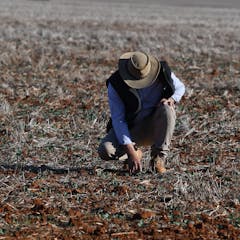
Articles on Climate change
Displaying 41 - 60 of 6805 articles

Use-inspired research goes beyond translational research to build lasting connections between researchers and communities.

South Australia stands out as having the weakest tree-protection laws, but cities around the nation are losing tree cover at a time when climate change makes them more important than ever.

With the recent scrapping of Nova Scotia’s Coastal Protection Act, the future of Canada’s iconic Bay of Fundy now rests in the hands of private interests, with potentially significant consequences.

In 1898, a pioneering Antarctic expedition was stuck in sea ice for over a year. In 2024, that area is open water.

While some countries are more likely than others to sign an international agreement to phase out fossil fuels, measures to tackle fossil fuel demand by adding a higher carbon price are essential.

Coastal fishing communities in west Africa face increased poverty as fish stocks decline.

Recent flash droughts in parts of NSW and Victoria appeared quickly and can be followed by intense flooding rains. It’s part of a global trend driven by global warming.

El Niño can direct more warm water to the base of West Antarctic ice shelves, accelerating melting and increasing global sea level.

Why the weather can be sunny one minute then rainy the next.

A coastal scientist explains why marshes, mangroves and other wetlands can’t keep up with the effects of climate change, and how human infrastructure is making it harder for them to survive.

Ghana is experiencing record high temperatures and rainfall patterns have become inconsistent.

Why the public resistance to carbon tax policies? New research suggests a few key factors that may play a role in influencing popular support for carbon tax efforts in Canada.

You might be wondering: what is a ‘Black Nor'easter’, what’s causing all this rain and does it have anything to do with climate change? Here’s what you need to know.

So much is being lost due to climate change, one can feel deranged. But the world still hums with beauty and astonishment – there is much for us to save.

AI needs careful monitoring and the right policies to ensure it can benefit the fight against climate change.

The big question: Would climate engineering like sending reflective particles into the stratosphere or brightening clouds help reduce the national security risks of climate change or make them worse?

Even with the best intentions, policies from different government departments can clash.

New research has found that clean tech has much better prospects in the U.S., while oil and gas firms in Canada may outlast their American counterparts.

Knowing which parts of Africa best help to store carbon means funding and policy efforts can be directed to protecting and increasing this carbon ‘land sink’.

Some butterflies are expanding their ranges as the climate changes, others are dwindling.





